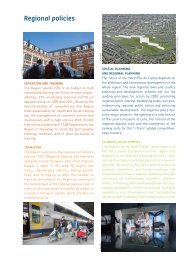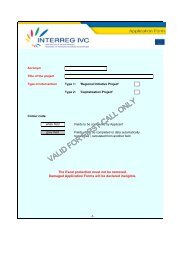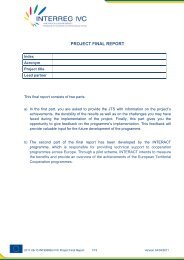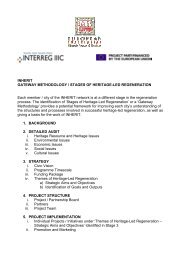Multifunctional Intensive Land Use â A Practitioner's Guide
Multifunctional Intensive Land Use â A Practitioner's Guide
Multifunctional Intensive Land Use â A Practitioner's Guide
You also want an ePaper? Increase the reach of your titles
YUMPU automatically turns print PDFs into web optimized ePapers that Google loves.
MILUnet 3 rd Draft Practitioners <strong>Guide</strong><br />
MILU METHODOLOGY<br />
MILUNET activities are centred around 2 series of bi-annual network<br />
workshops in different regions. Workshops start with a seminar,<br />
followed by a study visit to the case study areas selected by the Host<br />
partner and an implementation laboratory. Meetings are well prepared<br />
with documentary papers and studies, and are structured in such a way<br />
that it will provide all partners, but in particular host partners, with<br />
practical suggestions for dealing with MILU problems. At each<br />
workshop relevant reference cases of other partners are presented.<br />
These cases are dealing with similar problems and/or provide useful<br />
solutions and are inspirational input for the Implementation Lab.<br />
Implementation Lab<br />
Core of the 3 days workshop is the Implementation Lab. The<br />
Implementation Lab is meant to give momentum to a local/regional<br />
project, by implementing MILU concepts into practice. The<br />
Implementation Lab is a ‘Laboratory’ or ‘Pressure Cooker’. All partners<br />
work together with the Host partner on a regional MILU case, for which<br />
the Host partner is responsible. The ‘real problem’ situation will seduce<br />
the MILUnet partners to produce the best of their knowledge on MILU.<br />
The need to help solve a practice problem will tap off the maximum of<br />
the partnerships know how. The case area is an area in the region of<br />
the Host partner that will go through a (re)development process with<br />
special opportunities for MILU solutions.<br />
The Laboratory is an interactive session in which stakeholders in the<br />
region of the Host partner will work together on the spot with the<br />
MILUNET project partners and members of the Innovation Board. The<br />
main goal is to go a step forward in the process of realization and come<br />
to recommendations for the case area. This includes spatial solutions,<br />
environmental risk management concepts, architectural ideas, solutions<br />
for social problems and crime prevention, process organisation,<br />
financing and policy strategies.<br />
Six considerations<br />
Aim of the MILUnet Implementation Lab is to investigate as a group<br />
both new and persistent urban problems as they relate to <strong>Multifunctional</strong><br />
and <strong>Intensive</strong> <strong>Land</strong> <strong>Use</strong> (MILU).<br />
MILUnet Implementation Labs focus on six considerations, that<br />
integrate social, economical, political, structural and ecological issues<br />
and have been developed to think “out of the box”:<br />
Identity<br />
Do the project areas have their own identity? How can this identity be<br />
enhanced and improved? Are there local aspirations that can be<br />
capitalised?<br />
Critical Mass<br />
Does each site have the development, infrastructure and resident<br />
population to maintain a coherent community? What additional<br />
elements are needed to reach and support desired critical mass?<br />
Connections<br />
Page 10 of 15







